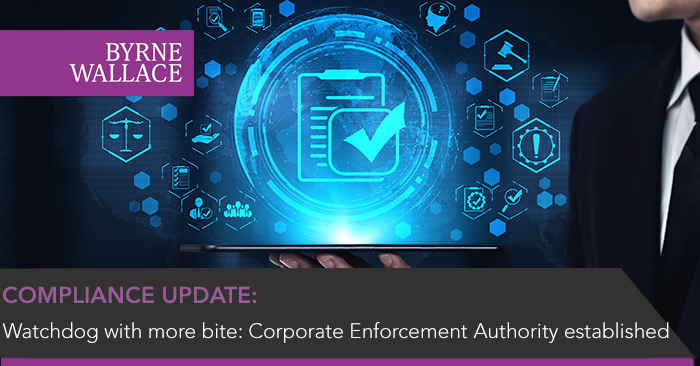Compliance Update – Watchdog with more bite: Corporate Enforcement Authority established
Tuesday, 16 August 2022
The long awaited Corporate Enforcement Authority (the CEA) was established on 7 July 2022 when the Tánaiste and Minister for Enterprise, Trade & Employment signed the Companies Act 2014 (Corporate Enforcement Authority) (Establishment Day) Order 2022.
The CEA replaces the Office of the Director of Corporate Enforcement (the ODCE). The ODCE was not an independent agency but an office within the Department of Enterprise, Trade and Employment. The CEA now has a strengthened mandate through being restructured as an independent commission with greater autonomy, accountability and resourcing.
The establishment of the CEA comes on foot of the Government’s publication of a suite of regulatory, corporate governance and law enforcement measures to combat corporate, economic and regulatory crime. One such measure was the establishment of a multi-agency review group on economic crime and corruption (the White Collar Crime Review Group). The White Collar Crime Review Group’s final report identified the need for additional resources and functions in the ODCE. In April 2021, the Minister for Justice published an implementation plan in respect of the White Collar Crime Review Group’s report.
The Company (Corporate Enforcement Authority) Act 2021 (the CEA Act) which provided for establishment of the CEA and governs the CEA was enacted in December 2021 (click here to read our previous update on the CEA Bill which includes an overview of the structural reform and key powers of the CEA).
Composition of the CEA
The CEA Act increases the autonomy of the CEA by establishing it as a statutory and independent agency. It makes provision for up to 3 full time commissioners, entitled Members, with one Member designated as the Chairperson of the CEA. A key function of the CEA will lie in its ability to structure itself, recruit directly, appoint its own staff and evolve to meet the Authority’s needs in a more timely fashion. This is also reflected in the greater resources now available to the CEA. In preparation for establishment of the CEA, the ODCE received a budget increase of €1 million and an increase of over 50% in the number of members of An Garda Síochána seconded to it. Provision has also been made for the allocation of 14 additional civil servants to the CEA. A Memorandum of Understanding between the CEA and An Garda Síochána was recently put in place that will make additional Garda resources available to the CEA to enhance criminal enforcement of company law.
Powers of the CEA
All powers and functions of the ODCE have been transferred to the CEA by the CEA Act, including encouraging compliance with company law, supervising the activities of liquidators and directors of insolvent companies, investigating suspected breaches and taking enforcement action in response to identified breaches with certain modifications to reflect the new structure of the CEA.
While the CEA Act did not significantly increase the statutory powers of the CEA, the Minister for Justice published, in April 2022, further measures to tackle white collar crime and corporate misconduct which, if implemented, could see the CEA bestowed with further powers such as statutory powers of surveillance.
Significance of the CEA
Establishment of the CEA is a significant step in strengthening the State’s capacity to effectively investigate and prosecute white collar crime in Ireland. The increased autonomy, independence and resourcing of the CEA and its increased access to specialist expertise should all have a positive impact on the level, effectiveness and speed of the investigation and enforcement of breaches of company law by the CEA, which will be further enhanced if the proposed additional CEA powers noted above are enacted into law.
Further information
The CEA has published on its website (cea.gov.ie) a useful FAQ on its role, functions and powers and guidance on rights and responsibilities of directors, secretaries, company members, shareholders and creditors.
We will continue to monitor developments regarding the CEA and, more broadly, implementation of the recommendations of the White Collar Crime Review Group and to publish updates.
For more information on the above or for general advice on corporate governance and compliance and regulatory investigations, please contact Gillian O’Shaughnessy, Jon Legorburu, Seán O’Donnell or any member of our Corporate Governance and Compliance group or Corporate Crime, Cyber-crime and White Collar Litigation/Investigations team.

